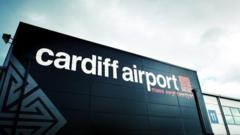Is Bristol Challenging Cardiff Airport's Subsidy?

Bristol Airport's Legal Challenge: Understanding the Implications of Subsidies on Competition
The ongoing debate surrounding the legal challenge initiated by Bristol Airport against the Welsh government's plans to subsidize Cardiff Airport is heating up. The Welsh government proposes to allocate £206 million over the next decade to bolster Cardiff Airport's passenger numbers and enhance its facilities. This article delves into the intricacies of this challenge, the implications for competition within the aviation industry, and what it means for passengers and the economy in Wales. By the end of this discussion, you will have a comprehensive understanding of the situation and its potential impact on the aviation landscape in the region.
Background: The Airports in Question
Bristol Airport and Cardiff Airport serve as essential gateways for air travel in the South West and Wales, respectively. Bristol Airport is privately owned and has seen consistent growth over the years, while Cardiff Airport, acquired by the Welsh government in 2013, has received substantial public funding aimed at revitalizing its operations.
The Financial Landscape of Cardiff Airport
Since its nationalization, Cardiff Airport has benefited from around £179.6 million in loans and grants, with an additional £20 million allocated for the current financial year. The Welsh government hopes that this concerted investment will allow Cardiff Airport to attract two million passengers annually and enhance its cargo and maintenance facilities.
Concerns Raised by Bristol Airport
Bristol Airport has voiced concerns regarding the unprecedented nature of the proposed subsidy. They argue that the financial support could exceed Cardiff Airport's annual turnover, marking a significant distortion in market competition. Key points raised by Bristol Airport include:
- The proposed subsidy is unprecedented in the UK aviation sector.
- There are concerns over market distortions and an uneven playing field.
- Taxpayer costs could be substantial without ensuring net economic benefits.
The Legal Challenge: What’s at Stake?
Bristol Airport's legal challenge is being pursued through the Competition Appeal Tribunal. Their argument hinges on the premise that the subsidy violates competition principles, ultimately harming the economic landscape of the region. Economy Secretary Rebecca Evans has stated that the Welsh government will vigorously defend its position, emphasizing the importance of Cardiff Airport to the South Wales economy.
Implications for Competition
The Competition and Markets Authority (CMA) previously reviewed the Welsh government's approach, suggesting that more systematic evidence is required to assess the subsidy’s effects on competition. They pointed out several "unevidenced assumptions" made by the Welsh government regarding the impact on Bristol Airport. This scrutiny raises critical questions about how subsidies affect market dynamics in the aviation industry.
The Economic Impact of the Subsidy
The Welsh government argues that Cardiff Airport's growth is vital for regional economic development. Thousands of jobs are linked to the airport, and the government believes that with the right investment, Cardiff Airport can play an even greater role in supporting the local economy. However, critics highlight the potential for wasted taxpayer money if the subsidy does not result in a significant increase in passenger numbers or economic benefits.
Key Economic Arguments
- Job Creation: Proponents of the subsidy argue that Cardiff Airport can create more jobs, thereby stimulating local economies.
- Regional Connectivity: Improved facilities could enhance the region's connectivity, making it more attractive for businesses and tourists.
- Investment Return: The government believes that the investment will yield a substantial return in terms of economic output.
Public Opinion and Political Reactions
The debate has sparked various reactions among political figures and the public. Conservative Senedd member Sam Rowlands has labeled the subsidy as excessive, especially given that passenger numbers have not yet returned to pre-pandemic levels. He has called on the government to consider selling Cardiff Airport instead of continuing to pour taxpayer money into it.
The Public Sentiment
Public opinion on the subsidy is mixed. Many citizens are concerned about the use of taxpayer funds for what some perceive as a misallocation of resources, while others support initiatives aimed at boosting local economic growth. The contrasting views highlight a broader discussion about the role of government in supporting industries viewed as vital for regional development.
Future Considerations for Both Airports
The outcome of the legal challenge will have significant ramifications for both Bristol and Cardiff Airports. If the Welsh government’s subsidy plan proceeds, Bristol Airport could face heightened competition that may challenge its market position. On the other hand, if the challenge succeeds, it may deter future government interventions in the aviation sector, setting a precedent for how public funding is utilized.
Strategies for Both Airports Moving Forward
- Innovative Marketing: Both airports must enhance their marketing strategies to attract more passengers.
- Service Improvement: Upgrading facilities and services can create a better customer experience, crucial for maintaining competitiveness.
- Collaboration: Exploring potential partnerships with airlines and other stakeholders may create synergies beneficial for continued growth.
The Broader Implications for the UK Aviation Sector
This legal challenge is not just about two airports; it reflects a broader issue within the UK aviation industry. The implications of government subsidies can influence market behavior, competition, and consumer choice. Understanding how these dynamics unfold will be critical for stakeholders across the sector.
Learning from Other Markets
Internationally, many countries have faced similar challenges regarding state funding for airlines and airports. Drawing lessons from these markets could prove valuable for UK policymakers. Key takeaways include:
- Ensuring transparency in subsidy allocations to maintain public trust.
- Establishing clear criteria for evaluating the effectiveness of subsidies.
- Encouraging competition without distorting market dynamics.
Conclusion: What Lies Ahead for Bristol and Cardiff Airports?
The legal challenge by Bristol Airport against the Welsh government's subsidy plans for Cardiff Airport raises significant questions about fairness, competition, and economic sustainability in the aviation sector. As the situation unfolds, it will be crucial for both airports to adapt and innovate to ensure their long-term viability.
Ultimately, the outcome of this challenge could reshape the aviation landscape in Wales and beyond. How the government, airports, and the public respond will determine the future of air travel in the region. Will we see a more competitive and fair environment, or will the ongoing subsidies lead to unintended consequences?
Frequently Asked Questions
What is the legal challenge launched by Bristol Airport about?
Bristol Airport is challenging the Welsh government's plan to subsidize Cardiff Airport, arguing that it distorts competition and exceeds Cardiff's annual turnover.
How much funding is Cardiff Airport receiving from the Welsh government?
The Welsh government plans to allocate £206 million over ten years to Cardiff Airport to boost passenger numbers and improve facilities.
What are the economic implications of the proposed subsidy?
The subsidy aims to create jobs and enhance regional connectivity, but critics argue it could lead to wasted taxpayer money without significant economic benefits.
As the legal proceedings continue, it is essential to consider how this situation may influence future policies and practices in the aviation industry. What do you think will be the long-term impact of this legal challenge on air travel in the UK? #Aviation #BristolAirport #CardiffAirport
Published: 2025-07-09 14:21:04 | Category: wales



